9 Effective Yoga Asanas that Help Relieve Headaches
Yoga is an age-old practice that involves working on the body, mind, breath, and spirit together. Long before any medicines were used for treatment, yoga was used as a method to keep the body in pristine health. Today, yoga is being advocated as a natural option to control conditions ranging from arthritis and rheumatism to blood pressure, diabetes, and thyroid. In this article, we will be focusing on the practice of yoga for headache.
Yoga Asanas to Relieve Headaches
Yoga works on restoring balance and harmony within the body. It aims at removing stiffness and tension and improves blood circulation to all parts. The flow of oxygen is another vital element that yoga primarily focuses on. Therefore, when performing any asana, remember to do it in a calm state of mind and unhurried fashion. Most importantly, remember to focus on your breathing at all times. Don’t be fooled by the long names. You will often find yoga asanas with names that are hard to pronounce because like the yogic practice itself, the names have been in Sanskrit. When you understand the asana or pose, you will find that it is, in fact, effortless to perform. Here we bring you a set of 9 yoga asanas that can help to calm and relax your body and help relieve your headaches instantly.
#1 Padangusthasana
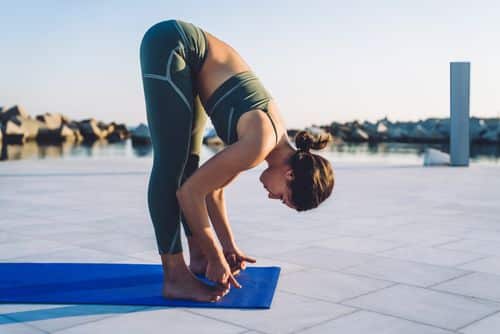
Padangusthasana is among the most basic poses in practice. When learning yoga, this is one of the first exercises that are taught.
To perform this pose,
- Stand with your feet slightly apart.
- Now bend forward slowly at the waist all the way to the bottom, and hold the big toe of each foot with your hand.
This pose requires a considerable amount of flexibility, so do not worry if you cannot go all the way down. To start with, bend your knees slightly, or simply go as low as your body allows you to.
Benefits
This pose helps increase the blood flow to the brain. With more oxygen and blood in the brain, you are certain to experience immediate relief from your headache.
#2 Marjariasana
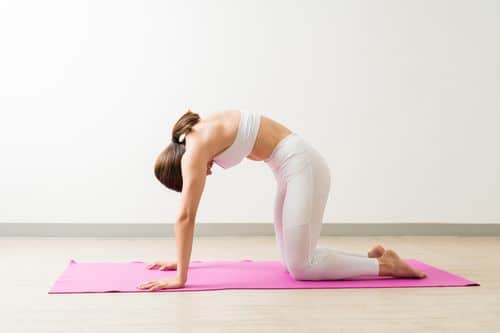
This asana is called the cat pose.
For this pose,
- Get down on your knees, and place your palms on the floor.
- Stretch your feet out behind you, and ensure your back is straight, in a position parallel to the floor. This is your starting position.
- Now arch your back, pulling yourself upwards and away from the floor.
- Pull as high as you can, and drop your head slightly.
- Hold, and release the asana.
You could also do the converse once you are back in the starting position. Arch the other way, bringing your back toward the ground and lifting your head towards the ceiling. When you Inhale look up and arch the back and when you exhale look down towards the chest. This is a variation of the asana that can also be performed in alternate repetitions.
Benefits
This pose stretches the back and neck well, relieving tension and stress. It is also a good pose to help improve blood circulation.
#3 Ardha Pincha Mayurasana
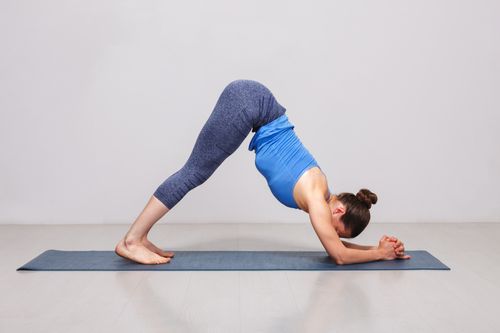
The more common name for this asana is the dolphin pose or the peacock pose (the name Mayura means peacock, and pincha means feather).
To begin this asana,
- You need to have your hands and knees on the floor.
- Your forearm should be placed firmly on the floor, ensuring your elbows and shoulders are all in a straight line.
- Now lift off, making sure your back and hips come off the ground. Your head should be on the ground, tucked between your elbows.
- Remember, at this stage, your forearms, head, and feet are the only parts of your body in contact with the ground.
This pose, to the onlooker, resembles an inverted form of the letter ‘V’. Hold this pose for a few seconds, and slowly come back to your starting position.
Benefits
This pose gives the body a very good stretch and relaxes it fully. It also helps improve the flow of blood and oxygen to the brain and is among the best yoga exercises for headaches.
#4 Balasana
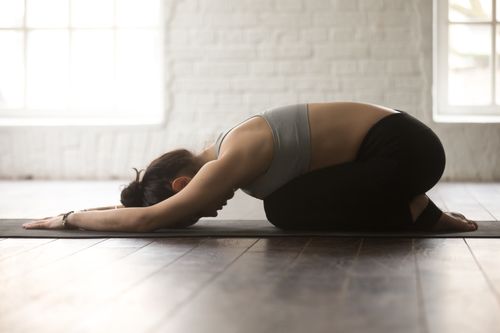
The child pose is an easy asana to perform.
To perform this asana,
- Sit down on your knees.
- Stretch your thighs, and let your bottom rest on your feet.
- Now lower your body to the floor until your head touches the ground. You will notice your head drop close to your knees.
- Stretch your arms out toward your feet and hold this position for a few counts. Now release and come back to the starting position slowly.
Benefits
This exercise is great for those with anxiety and stress since it calms the body and also helps reduce pain in the body. It improves blood circulation toward the head region.
#5 Supta Virasana
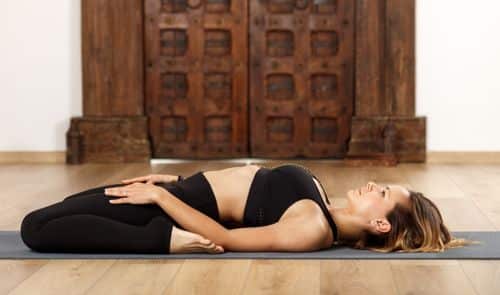
This yoga posture is known to improve restoration. It helps better our breathing. It helps strengthen the arches of the foot.
To perform this pose,
- Sit down on your knees and let your buttocks touch the floor.
- Place your feet fully on the floor, and let them face outwards.
- Do not rest your bottom on your legs.
- Now gently lower your body using the support of your hands and lie down on the floor.
- Let your legs maintain their position and feel the stretch. Now take your hands over your head and form a namaste pose.
- Your hands, head, and feet must all be on the floor.
Ensure you feel every part of your body stretch out completely.
Benefits
This asana harmonizes the body beautifully, restoring balance almost immediately. The stretch helps release tension and reduces anxiety and headache almost instantly.
#6 Paschimottanasana
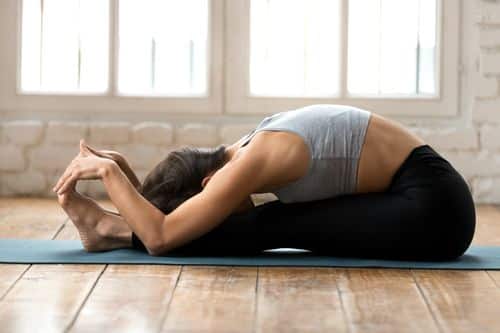
This is a fairly easy pose to execute, although it does require a certain amount of flexibility. This is also called a forward bend.
To practice this pose,
- Sit comfortably on your exercise mat, keeping your legs stretched straight.
- Now Inhale and raise your hands up and slowly lower your body till your head drops down onto your knees.
- Try and curl your hands around your toes, or clasp both hands together around your feet.
- Keep this position held for a few counts before you raise yourself into the starting position.
Benefits
This is an amazing exercise for people who experience headaches triggered by stress and anxiety.
#7 Setu Bandhasana
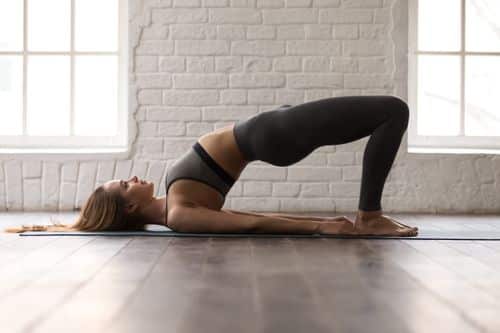
Most people know this exercise as the bridge pose. It helps in stretching the body and improves blood circulation.
To start off,
- Lie down on your back, with your knees bent and feet touching the floor.
- Keep your hands on your side, parallel to your body.
- Breathe in and out deeply.
- Now lift your back and thighs off the floor, so that only your head, neck, and feet continue to maintain contact with it.
- Hold this pose for a few counts, breathing in and out in a relaxed manner.
- Lower slowly and come back to the starting position.
You will notice that the arch of your torso and thighs give the impression of a wide bridge; this is where the pose gets its name.
Benefits
This is a very calming pose. The stretch in the body helps relax it, while the breathing helps steady the mind. Through this, you will find a lot of the tension in the body start to dissipate and feel stress and anxiety reduce significantly.
#8 Viparita Karani
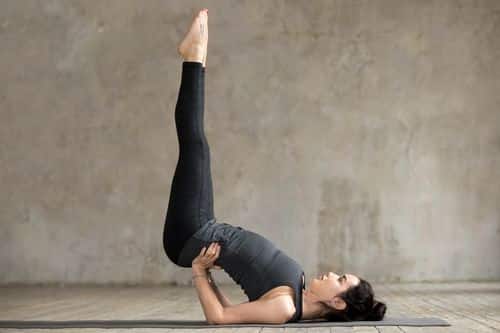
For this asana,
- Lie down flat and place your arms by your side.
- Now put your hands on your hips and slowly raise your legs at your waist.
- Lift off as high as you can, firmly keeping your shoulders placed on the floor.
Although this seems difficult, your body will be well-supported by your neck, shoulders, and arms. Hold this position for a few counts and lower gently.
Benefits
This is a very calming exercise that helps bring about control and balance within the body. It is great to relieve tension and headaches.
#9 Shavasana
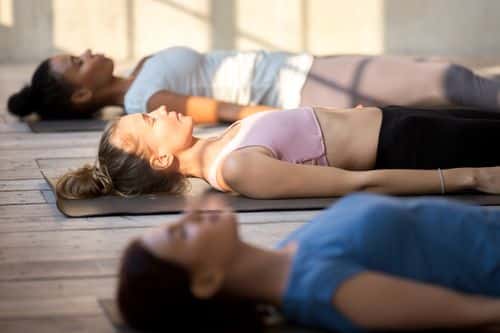
This is among the most common yoga poses since it follows every workout. This is the ultimate cool-down for anybody.
You can start off by,
- The pose requires you to lie on your back and with your arms and legs a comfortable distance apart.
- With your eyes closed, you need to lie in this posture for a few moments, focusing only on your breath.
Your mind is meant to be clear of all thoughts.
Benefits
This is a highly energizing and invigorating exercise that helps you deal with stress, aches, and pains. Maybe this is all you needed to cure the headache, after all!
Summary
Yoga has been designed to restore balance in the body and bring about physical, mental, and emotional harmony. Regularly practising yoga is the ideal solution to not just curing ailments, but preventing them from recurring as well. This is a wonderful practice for people of all ages and types. Ensure you get your dose of goodness every day!
Frequently Asked Questions (FAQs)
A. Yoga doesn’t usually have any side effects. There is also a minimal chance of suffering injuries while doing yoga. However, if you have any severe ailments or are pregnant, consult your doctor before you begin.
A. Yoga is an inclusive practice that is easy to follow by everyone and requires almost no equipment. However, all proponents of yoga advise that it be practiced on an empty stomach, and preferably when the bowels have been emptied too. It is best to give the body at least three hours after a meal before you do your exercises.
A. Yoga can be practiced almost any time, although its best perks can be experienced when it is done early in the morning. With yoga for headache, it is ideal that you do your exercises in the morning so that your body is fresh, and also so it feels strong and prevents headaches from occurring throughout the day.
A. A yoga routine should be at least thirty minutes long, including your breathing exercises, warm up asanas and Shavasana. If you have less time, you could choose the most essential asanas for the day, but do ensure that you practice for at least twenty minutes for it to work. Prayama also plays an important role in headaches. Nadi Suddhi pranayama can be done for 7 times along the complete routine.
